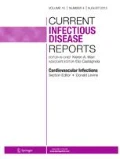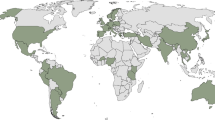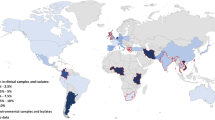Abstract
Oral triazole therapy is well established for the treatment of invasive aspergillosis (IPA), allergic aspergillosis (ABPA), and chronic pulmonary aspergillosis (CPA), and is often long-term. Resistance to triazole azole antifungal drugs in Aspergillus fumigatus is now a major clinical problem in a number of European locations, in China, Canada and the USA with particularly high frequencies from the north-west of the UK, and The Netherlands. A number of centers are reporting the continuing increasing frequency and evolution of resistance mechanisms in A. fumigatus, in both azole-naïve and patients treated with azoles. The increasing rate of resistance is of concern. A number of resistance mechanisms have been found. The biofilm modality of Aspergillus growth may have a number of therapeutic implications for aspergillosis, including antifungal resistance. Microbiological diagnosis of aspergillosis is limited by poor culture yield, leading to uncertainty about the frequency of triazole resistance. Direct resistance testing in culture-negative clinical samples may add additional insights into the prevalence of azole resistance in A. fumigatus.
Similar content being viewed by others
References
Papers of particular interest, published recently, have been highlighted as: • Of importance •• Of major importance
HPA Advisory Committee for Fungal Infection and Superficial Parasites. Fungal Diseases in the UK – 2006 http://www.hpa.org.uk/web/HPAwebFile/HPAweb_C/1196942156347
Warnock DW, Johnson EM, Richardson MD, et al. Modified response to ketoconazole of Candida albicans from a treatment failure. Lancet. 1983;19:642–3.
Fan-Havard P, Capano D, Smith SM, et al. Development of resistance in Candida isolates from patients receiving prolonged antifungal therapy. Antimicrob Agents Chemother. 1991;35:2302–5.
Rex JH, Rinaldi MG, Pfaller MA. Resistance of Candida species to fluconazole. Antimicrob Agents Chemother. 1995;39:1–8.
Heald AE, Cox GM, Schell WA, et al. Oropharyngeal yeast flora and fluconazole resistance in HIV infected patients receiving long-term continuous versus intermittent fluconazole therapy. AIDS. 1996;10:263–8.
Rautemaa R, Richardson M, Pfaller M, et al. Decreased sensitivity of Candida albicans to azole antifungals—a complication of long term treatment in autoimmune polyendocrinopathy-candidiasis-ectodermal dystrophy (APECED) patients. J Antimicrob Chemother. 2007;60:889–92.
Siikala E, Rautemaa R, Richardson M, et al. Persistent Candida albicans colonization and molecular mechanisms of azole resistance in APECED. J Antimicrob Chemother. 2010;65:2505–13.
Mulanovich VE, Kontoyiannis DP. Fungal pneumonia in patients with hematologic malignancies: current approach and management. Curr Opin Infect Dis. 2011;24:323–32.
•• Verweij PE, Snelders E, Kema GH, et al. Azole resistance in Aspergillus fumigatus: a side-effect of environmental fungicide use? Lancet Infect Dis. 2009;9:789–95. A comprehensive review on all aspects of azole resistance in Aspergillus fumigatus.
Richardson MD, Warnock DW: Fungal Infection: Diagnosis and Management, 4th Edition. Wiley-Blackwell, Chichester, 2012 (in press).
Smith NL, Denning DW. Underlying conditions in chronic aspergillosis including simple aspergilloma. Eur Respir J. 2011;37:865–72.
Pasqualotto AC, Powell G, Niven R, et al. The effects of antifungal therapy on severe asthma with fungal sensitization and allergic bronchopulmonary aspergillosis. Respirology. 2009;14:1121–27.
Denning DW, O’Driscoll BR, Hogaboam CM, et al. The link between fungi and asthma—a summary of the evidence. Eur Respir J. 2006;27:615–26.
•• Denning DW. Itraconazole resistance in Aspergillus fumigatus. Antimicrob Agents Chemother. 1997;41:1364–8. The first report of azole resistance in Aspergillus fumigatus.
•• Howard SJ, Cerar D, Anderson MJ, et al. Frequency and evolution of Azole resistance in Aspergillus fumigatus associated with treatment failure. Emerg Infect Dis. 2009;15:1068–76. The first report of azole in Aspergillus fumigatus in the UK.
Dannaoui E, Borel E, Persat F, et al. In-vivo itraconazole resistance of Aspergillus fumigatus in systemic murine aspergillosis. EBGA Network. European research group on Biotypes and Genotypes of Aspergillus fumigatus. J Med Microbiol. 1999;48:1087–93.
Verweij PE, Te Dorsthorst DT, Rijs AJ, et al. Nationwide survey of in vitro activities of itraconazole and voriconazole against clinical Aspergillus fumigatus isolates cultured between 1945 and 1998. J Clin Microbiol. 2002;40:2648–50.
Manavathu EK, Abraham OC, Chandrasekar PH. Isolation and in vitro susceptibility to amphotericin B, itraconazole and posaconazole of voriconazole-resistant laboratory isolates of Aspergillus fumigatus. Clin Microbiol Infect. 2001;7:130–7.
Mosquera J, Sharp A, Moore CB, et al. In vitro interaction of terbinafine with itraconazole, fluconazole, amphotericin B and 5-flucytosine against Aspergillus spp. J Antimicrob Chemother. 2002;50:189–94.
• Warris A, Weemaes CM, Verweij PE. Multidrug resistance in Aspergillus fumigatus. N Engl J Med. 2002;347:2173–4. The first report of the emergence of multidrug resistance against azole antifungals. An illustrative case report demonstrated that long-term prophylaxis with itraconazole resulted in infection with A. fumigatus strains that were resistant to azoles.
Oakley KL, Morrissey G, Denning DW. Efficacy of SCH-56592 in a temporarily neutropenic murine model of invasive aspergillosis with an itraconazole-susceptible and an itraconazole-resistant isolate of Aspergillus fumigatus. Antimicrob Agents Chemother. 1997;41:1504–7.
Osherov N, Kontoyiannis DP, Romans A, et al. Resistance to itraconazole in Aspergillus nidulans and Aspergillus fumigatus is conferred by extra copies of the A. nidulans P-450 14alpha-demethylase gene, pdmA. J Antimicrob Chemother. 2001;48:75–81.
Slaven JW, Anderson MJ, Sanglard D, et al. Increased expression of a novel Aspergillus fumigatus ABC transporter gene, atrF, in the presence of itraconazole in an itraconazole resistant clinical isolate. Fungal Genet Biol. 2002;36:199–206.
Nascimento AM, Goldman GH, Park S, et al. Multiple resistance mechanisms among Aspergillus fumigatus mutants with high-level resistance to itraconazole. Antimicrob Agents Chemother. 2003;47:1719–26.
•• Snelders E, Melchers WJ, Verweij PE. Azole resistance in Aspergillus fumigatus: a new challenge in the management of invasive aspergillosis? Future Microbiol. 2011;6:335–47. A timely, comprehensive review of azole resistance in Aspergillus fumigatus and the implications for treating patients with invasive aspergillosis.
•• Bueid A, Howard SJ, Moore CB, et al. Azole antifungal resistance in Aspergillus fumigatus: 2008 and 2009. J Antimicrob Chemother. 2010;65:2116–8. This report updates the level of azole resistance in Aspergillus fumigatus seen in isolates from patients attending the National Aspergillosis Centre, UK.
•• Denning DW, Park S, Lass-Florl C, et al. High-frequency triazole resistance found in nonculturable Aspergillus fumigatus from lungs of patients with chronic fungal disease. Clin Infect Dis. 2011;52:1123–9. This study describes the direct detection of resistance in culture-negative clinical samples using rapid molecular methods to detect resistance markers. Using this approach a high rate of azole resistance (55.1%).
Ramage G, Mowat E, Jones B, et al. Our current understanding of fungal biofilms. Crit Revs Microbiol. 2009;35:340–55.
Müller F-M, Seidler M, Beauvais A. Aspergillus biofilms in the clinical setting. Med Mycol. 2011;49 Suppl 1:S96–S100.
da Silva Ferreira, Capellaro JL, dos Reis Marques E, et al. In vitro evolution of itraconazole resistance in Aspergillus fumigatus involves multiple mechanisms of resistance. Antimicrob Agents Chemother. 2004;48:4405–13.
Rajendran R, Mowat E, McCulloch E, et al. Azole resistance of Aspergillus fumigatus biofilms is partly associated with efflux pump activity. Antimicrob Agents Chemother. 2011;55:2092–97.
Howard SJ, Harrison E, Bowyer P, et al.: Cryptic species and azole resistance in the Aspergillus niger complex. Antimicrob Agents Chemother. 2011. [Epub ahead of print].
Mortensen KL, Jensen RH, Johansen HK, et al. Aspergillus species and other molds in respiratory samples from patients with cystic fibrosis: a laboratory-based study with focus on Aspergillus fumigatus azole resistance. J Clin Microbiol. 2011;49:2243–51.
Disclosure
Paul Bowyer has received a grant from Astra Zeneca and stock options from Alergenetica SL; David W. Denning has served as a consultant for Lab21 Ltd and F2G Ltd, has been employed by The University of Manchester, and the National Institute of Allergy and Infectious Diseases, USA. He has also received grants and honoraria from Pfizer, Astellas, Myconostica, Merck, and Gilead, and patents from Myconostica; Malcolm D. Richardson has been a consultant and honoraria recipient for Gilead, Astellas, Pfizer, Cephalon, and Schering-Plough. He has also received payment for development of educational presentations from Gilead, Astellas, Pfizer, and Schering Plough, as well as travel and accommodation expense reimbursement from Gilead and Astellas. Riina Rautemaa and Caroline B. Moore reported no potential conflicts of interest relevant to this article.
Author information
Authors and Affiliations
Corresponding author
Rights and permissions
About this article
Cite this article
Bowyer, P., Moore, C.B., Rautemaa, R. et al. Azole Antifungal Resistance Today: Focus on Aspergillus . Curr Infect Dis Rep 13, 485–491 (2011). https://doi.org/10.1007/s11908-011-0218-4
Published:
Issue Date:
DOI: https://doi.org/10.1007/s11908-011-0218-4




